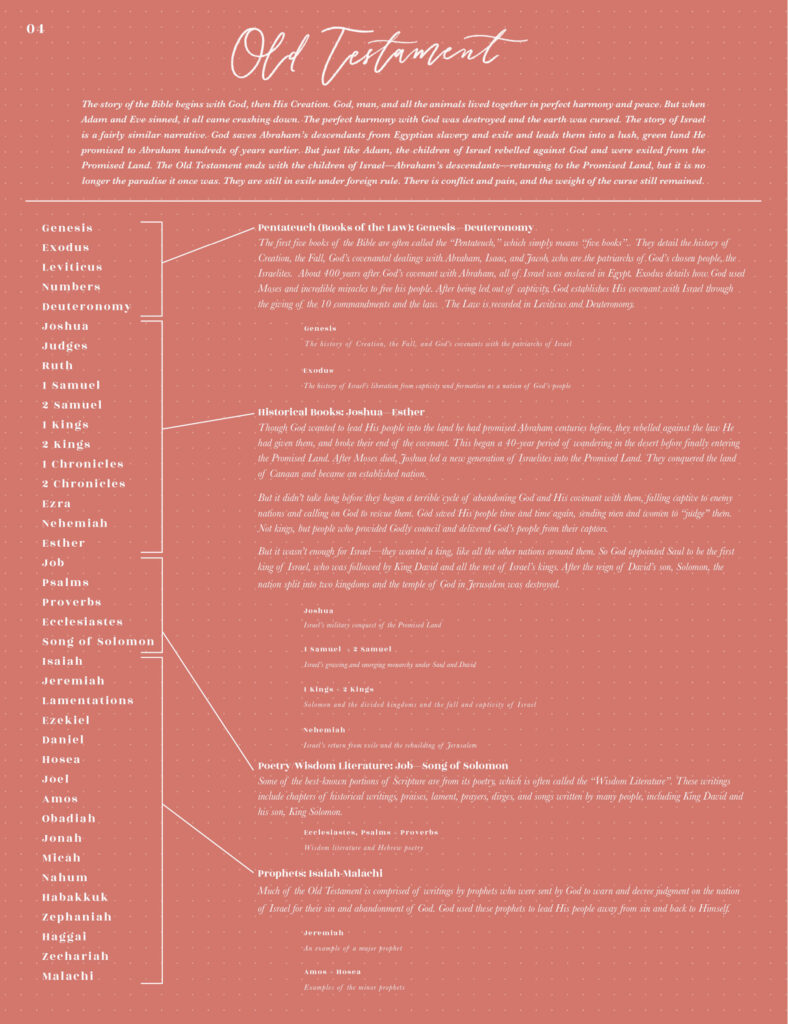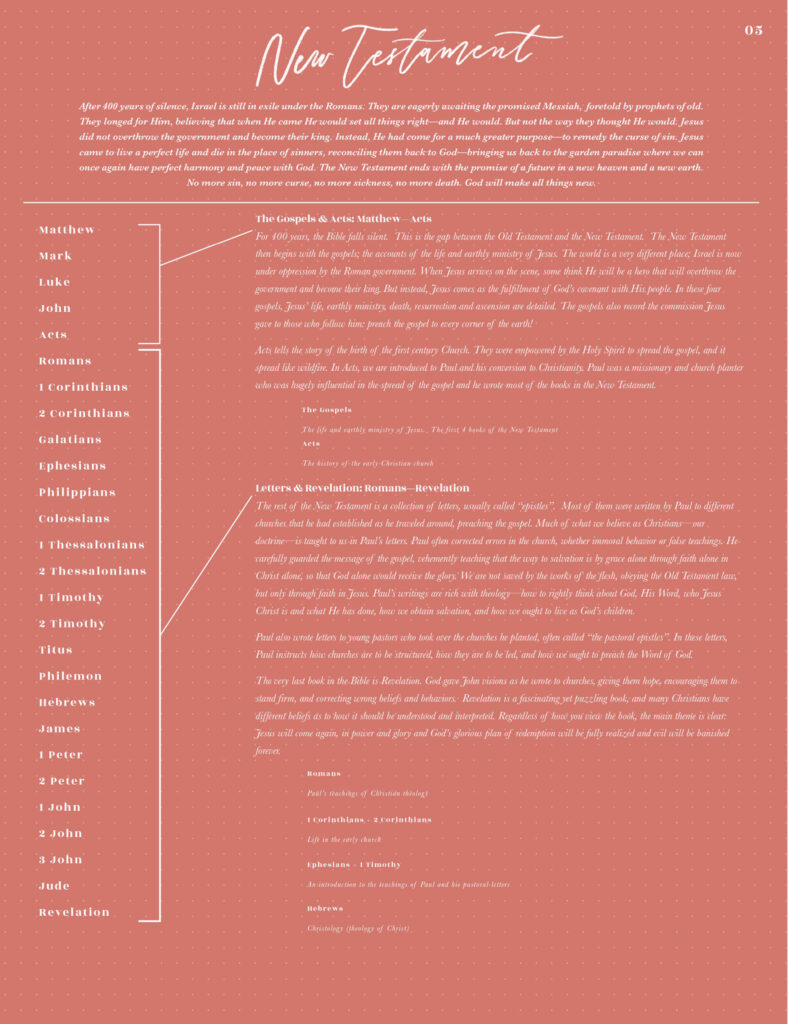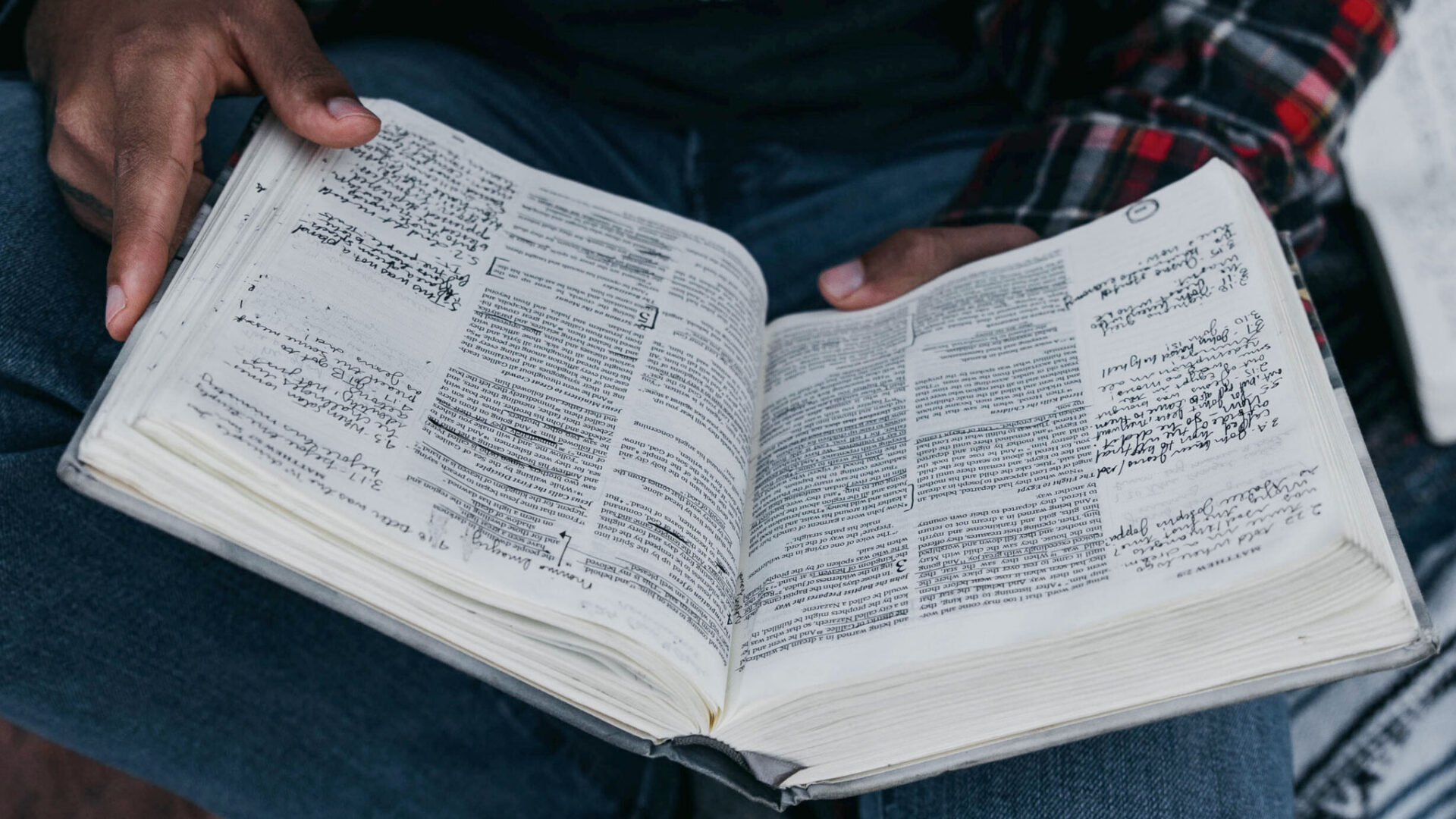Where do you even start when reading the Bible? I’m so glad you’re asking this question. The Bible is an incredibly valuable resource that is certainly overwhelming to someone who hasn’t studied it before. You might be someone who is familiar with Bible stories, but you’ve never embarked on your own Bible study. You might be someone with no background knowledge of the Bible at all. Either way, this short devotional is intended to help give you a small but solid foundation as you start your journey to know God through the Bible. While you can read straight through this article to the bottom, I’d invite you to follow the format provided for daily reading.
Before we start:
Why read the Bible?
The Bible is the tangible Word of God, the God who created the universe, sees all things, and knows your name. The Bible is the complete and true story of our being, history, and purpose, full of trials, triumphs, wilderness, deep longing, waiting, and ultimately, a Savior who came in the name of love. The words inside this book and the simple act of reading them will change your life if you’re willing.
Jeremiah 29:13 says, “You will seek me and find me if you seek me with all your heart.”
God tells us that his words are our daily bread, filling us up each day (John 6:35). God’s words give us strength to walk on earth in the calling he has placed on each of our lives. In the midst of your busy and draining life, choosing to make time to include God’s Word is a beautiful step of obedience that will open many doors, and lead you to places you could never ask or imagine.
By reading your Bible and reading the stories of God, you will discover who God is. You will hear stories of his greatness and his might, his creation and his power. You will discover that God is deeply intentional and specific with every single part of this world. You will learn that his love for you burns brighter than any you’ve ever seen before. You will see clearly that he has a call on your life, and a plan for this Earth that ends in a beautiful victory. As you read your Bible, and start to believe that God is who he says he is, you will begin to put your trust in him in ways you never thought you could, strengthening your faith day by day.
Many have a strong moral compass, a direction of right and wrong in their lives. We strive to be good; it’s in our nature. The words in this book will guide you and equip you for every good work, showing you the ways of Jesus and leading you to live a life that honors God, loves others, and spreads his kingdom. In that same thread, this book will challenge you, gently revealing to you ways you are walking that lead you away from God and his plan for you.
There is power in Scripture. When you can recall these words when life around you is crumbling, God will quiet your mind. Speaking the words of God over every situation helps you to lock eyes with God, and drown out the noise and lies that surround you. Reading God’s words daily truly sets our mind on things above, and prepares us to face anything that the world throws our way. Making time to read your Bible daily and engaging with God is one of the most powerful, necessary, and healing things you will ever do.
Check your Bible Translation
There are many valuable Bible translations available in English today. For someone that’s new to the Bible, we have a few suggestions that might make the beginning stages of your Bible study journey a little easier. Read them here.
TL;DR? The short answer is this: for new readers, we recommend reading the CSB, NIV, NLT, or ESV translation.
Day 1
The Whole Book is Good.
Read 2 Timothy 3:16-17 (The book of Second Timothy, Chapter 3, Verses 16-17. Near the end of the Bible, Look for “2 Timothy” in the table of contents.)
The Bible verses 2 Timothy 3:16-17 teaches us that truly, the whole book is good. In the Christian faith, we believe that the Bible is God’s Word. Although there were about 40 different human authors that contributed to this finished work, we believe that every single word that was included and preserved to be in the Bible was inspired by God, and entirely his decision.
You might have caught on that most people don’t read the Bible chronologically. It’s common to study different books of the Bible, or to jump from chapter to chapter in different books as you study a topic of the Bible. Tomorrow, we’ll look at the breakdown of the Bible, how it is organized, and where we suggest you start.
Think today: What have been your perceptions of the Bible? Do you find the words in Paul’s letters to Timothy hard to believe? Ask God to help you see the beauty of his Word over the next few days of study.
Day 2
Today, we’ll read three things:
- A chart that lays out the breakdown of the Bible to help you know your way around
- A short passage from the Old Testament in the Bible
- A short passage from the New Testament in the Bible
- Read through this chart, and digest all that the Bible holds. (You can view this guide in printable format here).


- Read Genesis Chapter 1 (The first chapter of the first book of the Old Testament)
The creation story might be familiar to you, or it might all be new. You probably have questions. For now, jot down any questions you have for later study. What’s important is to familiarize yourself with the language of the Bible.
- Read Luke 2:1-20 (The book of Luke, in the New Testament, Chapter 2, verses 1-20)
The story of Jesus’ birth might be familiar to you through your knowledge of the Christmas story. Again, jot down questions for future study.
You’ve just read two of the most famous stories in the Bible: one that begins the Old Testament, and one that begins the New Testament. The more you read, the more familiar these pages will become.
Tomorrow, we’ll read a chapter from the Book of Psalms in the Old Testament, and practice understanding the words in the Bible.
Tip: Highlighting or note taking in your Bible can be a helpful tool. It will help the Bible feel less daunting because as you continue to study, you will see how much you’re learning, and how much you’ve already covered.
Day 3
Read Psalm 23 (In the Old Testament, the Book of Psalms, all of chapter 23)
This Psalm was written by King David, a man who the Bible says was “after God’s own heart.” You might know him as the famous statue of David that stands 17ft tall in Florence, Italy, or as the teenage boy who slayed the giant Goliath with a slingshot and rock.
When studying Scripture, I recommend reading a passage all the way through once, then going back and reading it again to try to understand it deeper.
Read through Psalm 23 a second time, this time underlining any words that bring you comfort. Put a small question mark next to anything that leaves you confused. To answer your questions about confusing lines, I recommend a simple commentary like this one: https://enduringword.com/bible-commentary/psalm-23/
Commentary is a collection of thoughts and explanations from Bible scholars and theologians. They explain Bible verses line by line, or word by word to the best of their knowledge. It is often cumbersome. If you open up a commentary, know that you don’t have to read the whole thing, you can jump to the section that answers your question.
Tomorrow, we will read a story about Jesus in the New Testament and familiarize ourselves with New Testament teaching.
Day 4
Read first: John 10:1-6 (In the New Testament, the book of John, chapter 10, verses 1-6)
In the Gospels (the four books of the Bible that tell of Jesus’ time on Earth), Jesus often teaches in parables (a story told as an analogy or symbol). Again, it’s helpful to underline something that stands out to you, and to note any questions you have.
Then read: John 10:7-16
The people Jesus taught 2,000+ years ago weren’t so different from us. They were confused by many of his teachings initially, so Jesus often follows up with explanations.
After Jesus’ explanation, write down in a notebook what symbolism you can find in Jesus’ story. (Who do the sheep represent? The robber? The shepherd? The gate?)
We’ll finish out our 5-day devotional tomorrow with suggestions for where you might like to begin.
Day 5
Read first: Matthew 4:4, and Psalm 119:105
Finally, what should you read?
Our hope is that your time with God is not only to study and learn the stories of the Bible, but also time to love and adore God and his character. To know and to love someone takes time, practice and consistency. Below, we have linked a few guided Bible studies and a few Bible reading plans. Give each a glance, and choose one that feels interesting to you! If you have a specific topic in mind you’d like to learn more about, you can search Google for Bible reading plans on that topic, or a guided Bible study on that topic. We do not recommend relying on Google for all of your answers. It’s easy to ask Google “what does the Bible say about ____”, but the Bible truly is a complete and cohesive work, and it can become dangerous to study Bible verses out of their context.
To conclude: if you are new to the Bible, I recommend starting with a guided, daily Bible study. Here are two free ones on our website you might like:
Another option for a new reader is to read straight through a book of the Bible. I suggest following a reading plan through one of the gospels. We offer free reading plans through:
If you go the reading plan route, after you read each day, it’s helpful to ask yourself these questions:
- What did I learn about God?
- What did I learn about people?
- What did I learn about relating to God?
- What did I learn about relating to others?
Final tips:
Pick 2
I recommend always selecting what you want to read now, and what you want to study next. It is very common for people to fall into a “drought” after completing a Bible study, paralyzed by the question, what will I read next?
A Psalm a Day
If you finish a study and don’t know what to read, I recommend reading one chapter from the Psalms each day. There are 150 chapters in Psalms, so you won’t run out quickly. You’ll stay in the Word while you look for your next study or plan.
Start with Prayer
When you open the Bible, ask God to teach you exactly what you need through his Word. Ask him to calm your mind, and give you focus and attention to hear what he has to say. Pray that your time reading the Word would spark even more wonder in your heart.
Image credit: Lydia Supinger
Katie Guiliano founded Hosanna Revival in 2015 with a passion for beautiful design, and equipping women to know God in his fullness. She draws her inspiration from busy cities and picturesque landscapes. She lives in Cincinnati with her husband Nick, loves to travel, and cultivate her flower garden. The thing she finds most beautiful is people using their gifts to glorify the Lord.







1 comment
Can you share the book of Matthew reading guide? The link says it does not exist